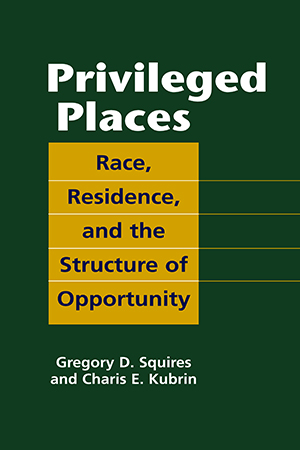Gregory D. Squires and Charis E. Kubrin
Now priced for course use!
In the United States today, quality of life depends heavily on where one lives—but high levels of racial segregation in residential communities make it frustratingly difficult to disentangle the effects of place from those of race. Gregory Squires and Charis Kubrin tackle these issues head-on, exploring how inequities resulting from the intersection of race and place, coupled with the effects of public policy, permeate and shape structures of opportunity in the United States.
Gregory D. Squires is professor of sociology at George Washington University. His publications include Color and Money: Politics and Prospects for the Community Reinvestment Movement in Urban America and Capital and Communities in Black and White: The Intersections of Race, Class, and Uneven Development. Charis E. Kubrin is associate professor of sociology at George Washington University. She is coeditor of Crime and Society (2nd edition) and has published numerous articles on race and crime.
"A hard-hitting and highly revealing analysis of overlapping forms of racial and urban inequality with emphasis on two policy domains: housing policy and crime.... It more than deserves to be widely read and will likely stand as a crucial guidepost for scholarship and policy intervention aiming to ‘sever the linkages between race, place, and privilege.”—Jennifer Darrah,
International Journal of Urban and Regional Research
"Squires and Kubrin’s narrative, ... lays bare the multilayered manner in which race and place structure urban areas, communities, and policies play in perpetuating and potentially combating inequality.... An undeniably important contribution to the study of the realities of race and place.” —Michael T. Maly, American Journal of Sociology
"A genuinely fresh perspective.... Students of urban inequality would do well to follow Squires and Kubrin's lead by directing attention to changes in the financial services industry that promote predatory lending and sanction racial profiling in property insurance, as well as to policy efforts to curb these disturbing trends."—Caroline Hanley, Contemporary Sociology
"What is most compelling about this book is Squires' and Kubrin's emphasis on showing how real policies have worked to benefit neighborhoods and how other policies could work as well....It should be read by everyone in hopes that somehow the political will to "sever the linkages among place, race, and privilege" can be found."—Nancy Denton, State University of New York and coauthor of American Apartheid
"Privileged Places blends clear theory, powerful analysis, and bold policy prescription to provide an eye-opening portrait of how race and class are written onto our cities and how, in turn, those places perpetuate race and class inequalities."—Mary Pattillo, Northwestern University and author of Black Picket Fences
"For those who believe race no longer matters, this is a must read. Privileged Places delineates how spatial arrangements compound racial and economic inequalities with inequities in exposure to crime, recidivism, and their many social costs."—James Austin, JFA Institute and coauthor of It's About Time: America's Imprisonment Binge
"Excellent.... An original and significant contribution to the study of place stratification."—Thomas McNulty, University of Georgia
"The most definitive analysis to date of how residence is a root cause of racial inequality in life-chance opportunities."—George Wilson, University of Miami








